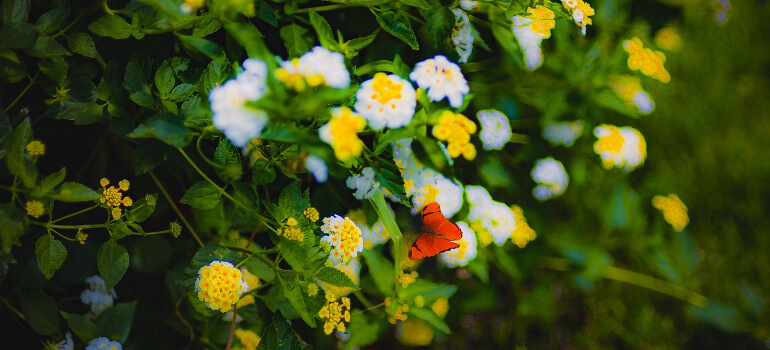
Regardless of whether you are just starting your gardening journey or are already a gardening pro, the question of how to stop detrimental pests from destroying your hard work will inevitably arise.
The two most popular methods of garden pest control are using pesticides and organic pest control. Due to fears that commercial pesticides negatively impact the biodiversity of gardens more and more, people are turning to organic gardening pest control methods instead.
Organic biocontrol employs the use of beneficial insects, as well as companion planting, to naturally repel or control pest populations. Bugs are an inevitable part of the ecosystem that is developing in your backyard. Plants provide harbour or sustenance and will bring a specific insect into your garden. The most common destructive insects for your crops and flowers are aphids, Colorado potato beetles, caterpillars, crickets, fleas, mites and more.
However, as the circle of life goes, there are also predatory bugs that feed on and even parasitize insect herbivores. As chemical pesticides are indiscriminate, they tend to kill beneficial insects, as well as harmful ones. This can cause an imbalance between the number of pests and that of their natural predators, leading to waves of different species invading the now insect-free area. Still, large numbers of insects are starting to show signs of immunity against commercial pesticides.
To achieve all-natural pest control, here’s a list of 14 beneficial garden insects (pictures included for easier identification) you should always welcome!
Table of Contents
Minute pirate bugs
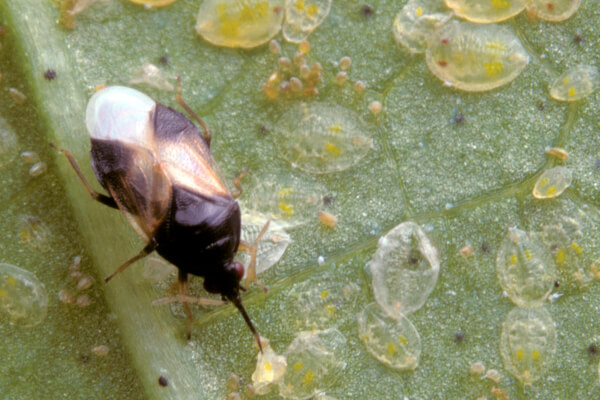
These fast black and white critters are indiscriminate hunters. They will attack and eat a wide range of bugs and pests. To attract minute pirate bugs to your garden, try planting daisies, yarrow, and alfalfa and rejoice in the decimation of the pest population that is sure to follow.
Plus, you get to tell your friends and family that your garden is full of pirates!
Soldier beetles
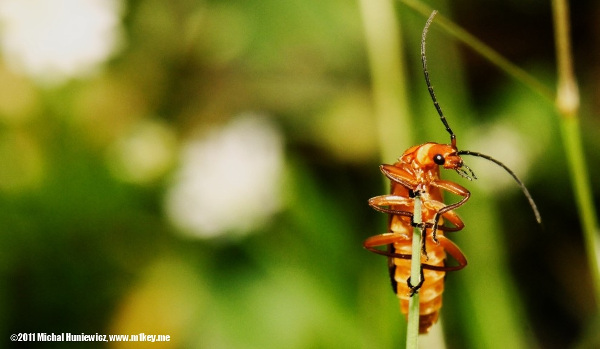
Author: Michał Huniewicz, licenced under CC-BY-2.0
These brightly-coloured beetles love to feast on aphids and caterpillars, as well as on some beneficial insects. Plant goldenrod, catnip, and hydrangea to lure an army of soldier beetles into your garden and the aphids won’t know what hit them.
Ground beetles
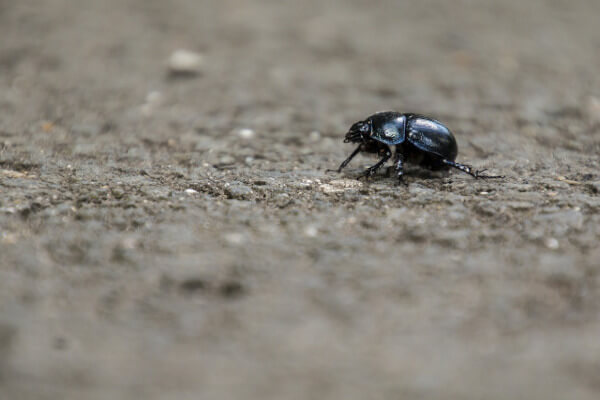
Ground beetles are the ninjas of the beetle world, only appearing at night to stealthily consume slugs, snails, and other soil-dwelling pests.
Incredibly, one ground beetle larvae can devour up to 50 caterpillars and, with such a voracious appetite, you can rest assured that your plants will be protected. Perennials, such as rhubarb and lovage, provide the ideal environment for ground beetles to thrive, so having a few perennials mixed in with other plants will keep the leaf-munching to a minimum.
Lacewings
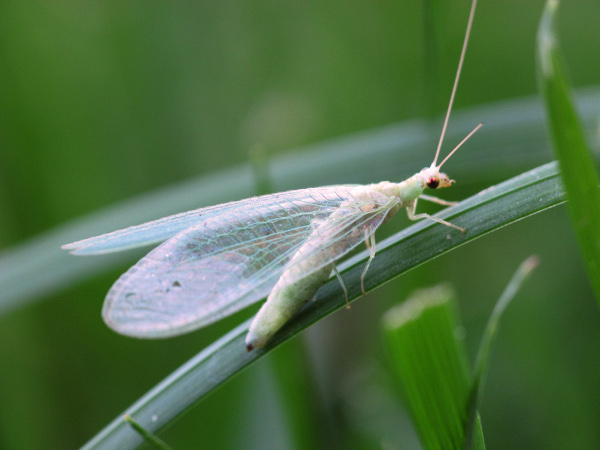
Author: siamesepuppy, licenced under CC-BY-2.0
These delicate-looking flies and their larvae eat a whole host of pests including aphids, caterpillars, thrips, and whiteflies. Encourage them into your garden by planting sweet alyssum, angelica, cosmos, and coreopsis.
Tachinid flies
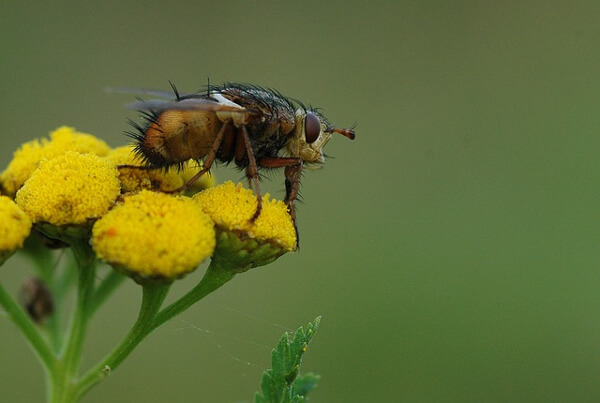
In a move similar to Ridley Scott’s Alien, the larvae of tachinid fly burrow their way into the bodies of caterpillars and proceed to eat them from the inside out. This may seem a tad gruesome but, when you consider the effect caterpillars have on plant life, it is somewhat justified.
Attract these caterpillar-destroying monstrosities into your garden by planting herbs such as dill, sweet clover, and parsley.
Braconid wasps
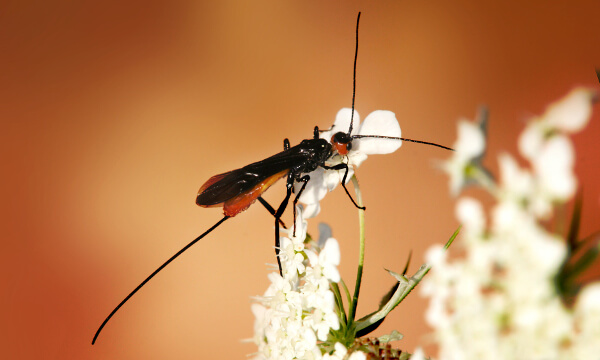
Author: Richard Bartz
Continuing the theme of gruesome pest control, braconid wasps are a great addition to your garden. The female of the species lays its eggs inside of its chosen host insect where the larvae will feed on its internal organs until they reach maturity.
Favourite victims of the braconid wasp include caterpillars, beetle larvae, moths, and aphids. To encourage this beneficial insect into your garden, plant nectar-producing plants with small flowers, such as wild carrot, parsley, and dill.
Spined soldier bugs
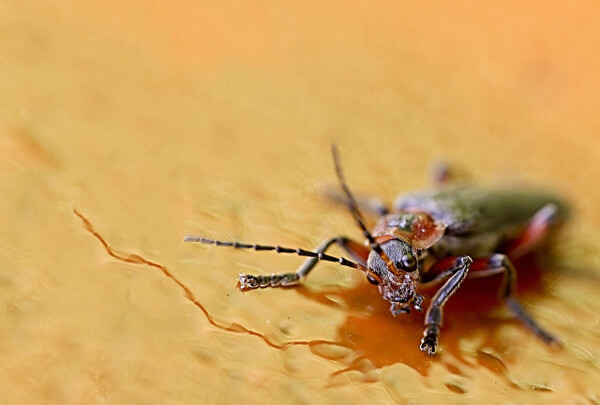
These bright red critters love nothing more than eating hairless caterpillars and beetle larvae. Plant a variety of perennials and permanent plants to attract them. They have really colourful and distinctively patterned shells, so you will easily spot their arrival.
Damsel bugs
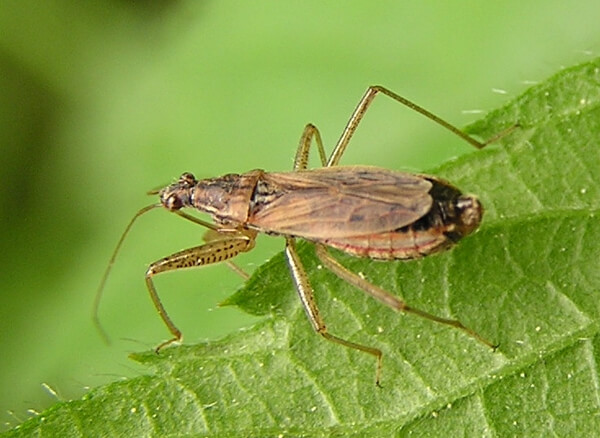
Author: Michael Becker
Despite their name, these bugs are far from being distressed. Instead, they are hunters of a wide variety of garden pests. They will sweep through populations of aphids, small caterpillars, thrips, and leafhoppers with great delight. To make your garden an enticing place to live, either plant some alfalfa or visit a field of alfalfa with a big net to catch and relocate some damsel bugs.
Aphid midge
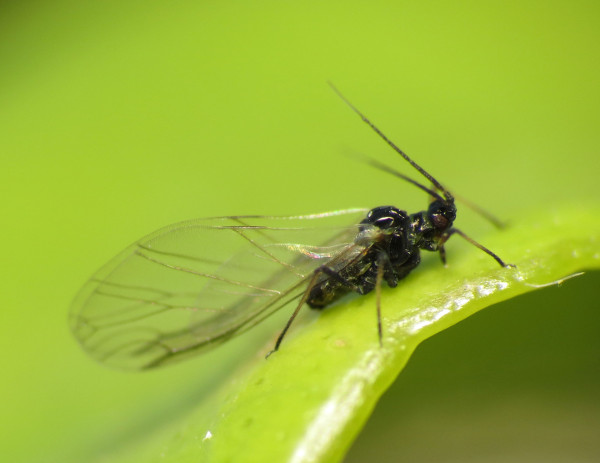
Author: Katja Schulz, licenced under CC-BY-2.0
Aphids love nothing more than sucking the vitality out of your plants, so plant some pollen-producing plants in your garden to attract their nemesis, the aphid midge. The larvae of this small fly will happily feast on over 60 types of aphid after paralysing them with its saliva.
Lady beetles
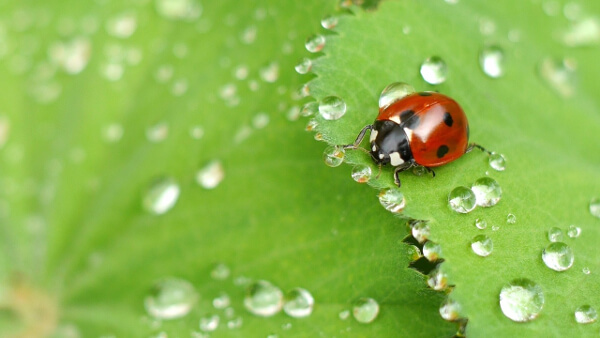
Lady beetles and their larvae are well known as friends of gardeners everywhere. This is due to their seemingly endless appetite for aphids and mites. Plants, such as dill, coreopsis, and fennel will ensure that your garden has a healthy population of lady beetles. Just keep in mind that they have been known to bite humans on occasion.
Hoverflies
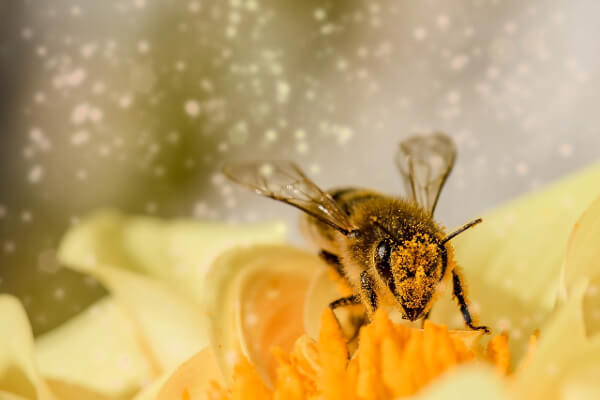
The larvae of the humble hoverfly feast on aphids, caterpillars, and scale bugs until reaching maturity where they will switch to eating pollen. Plants, such as common yarrow, fern-leaf yarrow, dill, and basket of gold will attract hoverflies, as well as provide a good food source for them during adulthood.
Praying mantis

Author: PsJeremy, licenced under CC-BY-2.0
Planting marigolds, dill, various shrubs and areas of tall grass will attract these creepy practitioners of insect kung-fu to your garden. After taking up residence, they will take it upon themselves to protect your plants from crickets, caterpillars, moths, and beetles with a calm and collected coolness that few other insects can match.
Mealybug destroyer

Author: Benny Mazur, licenced under CC-BY-2.0
With a name like that you will be expecting big things from these guardians of the garden. Thankfully, they live up to their imposing name. One mealybug destroyer can eat around 250 mealybug larvae, so their name is well deserved. Attract them by planting sunflowers, dill, fennel, and goldenrod.
Predatory mites

Author: Karen and Brad Emerson, licenced under CC-BY-2.0
These tiny insects are the double agents of the mite world. They feed almost exclusively on harmful spider mites, but will resort to eating pollen if none are available. They prefer to live in humid environments and, as such, will be attracted to greenhouses and conservatories with an abundance of flowering plants.
Need an expert gardener’s help for planting flowers or tending to them? Book an appointment with a professional here!
Enter your postcode to view our rates and availability in your area.
For questions about the services we offer visit our main site
So, there we have it, with this list of 14 beneficial insects your garden will be a safe haven for plants and a continuous nightmare for the pests that want to destroy that plant paradise in no time. Now is the time to ditch those chemicals and introduce some natural-born predators to your organic garden.
***
Did we miss anything? Do you know of any other insects which are beneficial to gardens? Let us know in the comments below or give us a shout on social media!




I really enjoyed reading this article, I didn´t know any of these insects. Another insect that brings benefits to the garden is the “centipede”; This acts as a predator and feeds on harmful insects for our plants. It needs wet floors and where there are stones that allow it to hide. He is the perfect guardian of our garden.
This is an awesome tip, Emily, and kudos on your blog, it’s quite inspiring for the garden lovers!
Releasing lady beetles at the right time is crucial. Much of the time it doesn’t work. There are ways to attract beneficial insects by stopping all pesticide use, even homemade pepper sprays.
Awesome list. I am feeling bad that I have killed or removed so many of these bugs thinking that they are destroying my plant. Also, spraying a lot of poison in name of pesticides would kill most of them anyway.
Yes Nehal, there are a few bugs that are actually helpful! Hope that this article also helped you!
Same here! I’ve been killing Red Spider Mite & Mealy Bug Eater & several others for years, not realizing they were beneficial for the garden.
This is a great way of controlling pests! Thank you for the tips – and for including the beloved lady bird, always a favourite!
I’m always promoting wildlife friendly gardens, and I asked my followers to spot insects in their gardens this summer so we could all share in the excitement – here’s what they came up with: https://mrplantgeek.com/2018/08/20/7-summer-insects-2018/
Hope you enjoy reading!
Thanks so much,
Michael (Mr Plant Geek)
Thank you for the insightful comment, Michael. Those critters are a fitting addition to the beneficial insects collection!
Many thanks for the information it was very helpful.. I was not aware that certain bugs could be so helpful in the garden. I will be more careful with my bug spray in future.
Thanks for sharing this helpful information with us regarding pest control, I really found this very helpful and interesting. The language of the blog is also very easy to understand and all the above tips are also very effective.